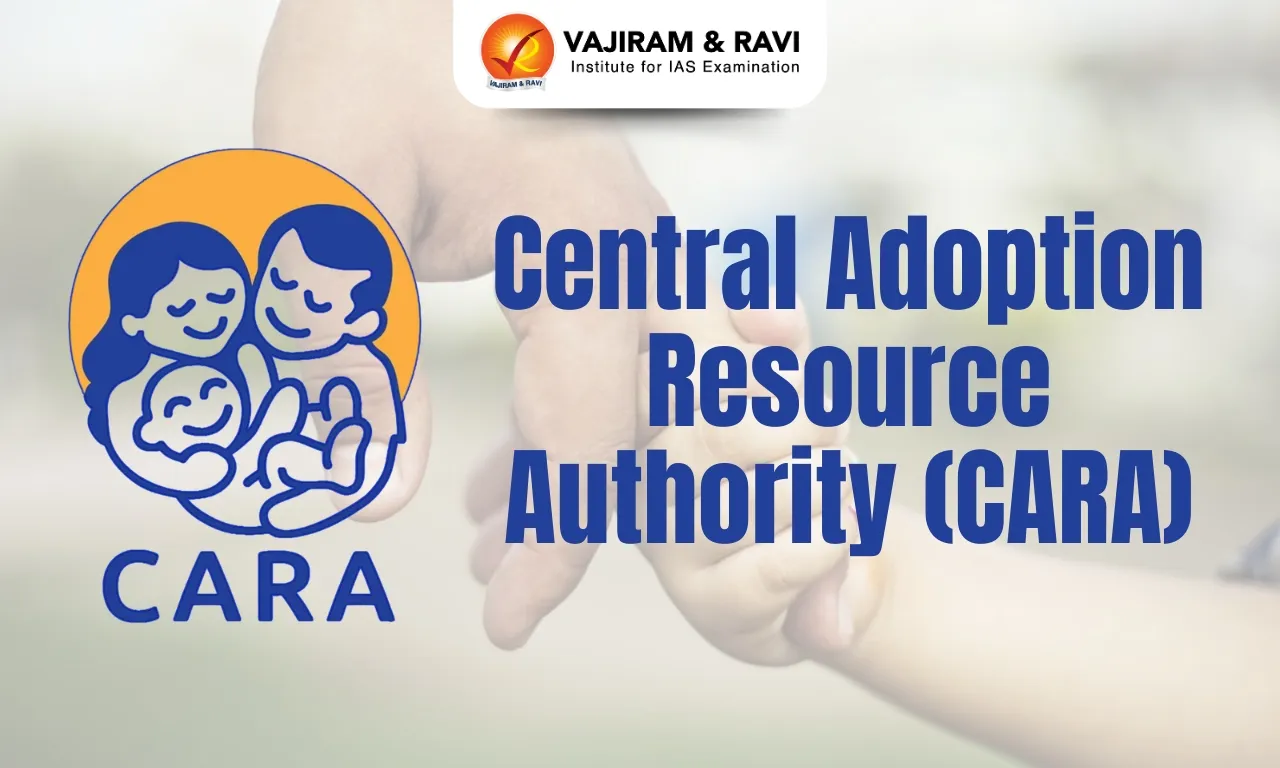Central Adoption Resource Authority Latest News
The Central Adoption Resource Authority (CARA) recently clarified that adoptive parents do not need hard copies of adoption orders, as digitally certified versions sent via e-mail are legally valid and sufficient under the current rules.
About Central Adoption Resource Authority
- It is a statutory body of the Ministry of Women & Child Development, Government of India.
- It was established in 1990 as an autonomous body.
- Through Section 68 of the Juvenile Justice (Care and Protection of Children) Act, 2015 (JJ Act 2015), CARA attained the status of a statutory body.
- It functions as the nodal body for adoption of Indian children and is mandated to monitor and regulate in-country and inter-country adoptions.
- CARA is designated as the Central Authority to deal with intercountry adoptions in accordance with the provisions of the Hague Convention on Intercountry Adoption, 1993, ratified by the Government of India in 2003.
- CARA primarily deals with the adoption of orphan, abandoned, and surrendered children through its associated/recognised adoption agencies.
- In India, a child can be placed with a family under the Hindu Adoption and Maintenance Act 1956, Guardians and Wards Act, 1890 and Juvenile Justice Act, 2000.
- The mandatory registration of Child Care Institutions (CCIs) and linking to CARA has been provided in the JJ Act 2015.
Functions of Central Adoption Resource Authority
- Monitor and regulate the procedure for in-country adoption;
- Receive applications of an Non-Resident Indian (NRI) or Overseas Citizen of India (OCI) or a foreigner living abroad through authorised adoption agency or Central Authority or the Government department or the Indian diplomatic mission concerned and process the same;
- Receive and process applications received from a foreigner or an OCI residing in India for one year or more, and who is interested in adopting a child from India;
- Issue No Objection Certificate in all cases of intercountry adoptions;
- Issue Conformity Certificate in the inter-country adoption cases under Article 23 of the Hague Adoption Convention in respect of intercountry adoption;
- Intimate the immigration authorities of India and the receiving country of the child about the inter-country adoption cases;
- Provide support and guidance to State Adoption Resource Agencies, District Child Protection Units, Specialised Adoption Agencies, and other stakeholders of adoption in related matters, through trainings, workshops, exposure visits, consultations, conferences, seminars, and other capacity-building programmes;
- Coordinate with State Governments or the State Adoption Resource Agencies and advise them in adoption related matters;
- Establish uniform standards and indicators;
- Conduct research, documentation, and publication on adoption and related matters;
- Maintain a comprehensive centralised database relating to children and prospective adoptive parents for the purpose of adoption in the Child Adoption Resource Information and Guidance System;
- Maintain a confidential centralised database relating to children placed in adoption and adoptive parents;
- Carry out advocacy, awareness and information, education, and communication activities for promoting adoption and other non-institutional child care services;
- Enter into bilateral agreements with foreign Central Authorities as prescribed under the Hague Adoption Convention, wherever necessary;
- Authorise foreign adoption agencies to sponsor applications of NRI or OCI or foreign prospective adoptive parents for intercountry adoption of Indian children;
- Set up counselling Centre in its headquarters and support State Adoption Resource Agencies for setting up of counseling centre at the State and District levels;
- It monitors and regulates bodies such as the State Adoption Resource Agency (SARA), Specialised Adoption Agency (SAA), Authorised Foreign Adoption Agency (AFAA), Child Welfare Committees (CWCs), and District Child Protective Units (DPUs).
Source: TH
Last updated on December, 2025
→ Check out the latest UPSC Syllabus 2026 here.
→ Join Vajiram & Ravi’s Interview Guidance Programme for expert help to crack your final UPSC stage.
→ UPSC Mains Result 2025 is now out.
→ UPSC Notification 2026 is scheduled to be released on January 14, 2026.
→ UPSC Calendar 2026 is released on 15th May, 2025.
→ The UPSC Vacancy 2025 were released 1129, out of which 979 were for UPSC CSE and remaining 150 are for UPSC IFoS.
→ UPSC Prelims 2026 will be conducted on 24th May, 2026 & UPSC Mains 2026 will be conducted on 21st August 2026.
→ The UPSC Selection Process is of 3 stages-Prelims, Mains and Interview.
→ UPSC Result 2024 is released with latest UPSC Marksheet 2024. Check Now!
→ UPSC Prelims Result 2025 is out now for the CSE held on 25 May 2025.
→ UPSC Toppers List 2024 is released now. Shakti Dubey is UPSC AIR 1 2024 Topper.
→ UPSC Prelims Question Paper 2025 and Unofficial Prelims Answer Key 2025 are available now.
→ UPSC Mains Question Paper 2025 is out for Essay, GS 1, 2, 3 & GS 4.
→ UPSC Mains Indian Language Question Paper 2025 is now out.
→ UPSC Mains Optional Question Paper 2025 is now out.
→ Also check Best IAS Coaching in Delhi
Central Adoption Resource Authority FAQs
Q1. What is the Central Adoption Resource Authority?+
Q2. What is the primary role of Central Adoption Resource Authority (CARA)?+
Q3. Which international convention guides CARA in inter-country adoptions?+
Q4. CARA issues which certificate in inter-country adoptions under the Hague Convention?+
Q5. Which section of the Juvenile Justice (Care and Protection of Children) Act, 2015, confers statutory status to CARA?+
Tags: central adoption resource authority prelims pointers upsc prelims current affairs

















